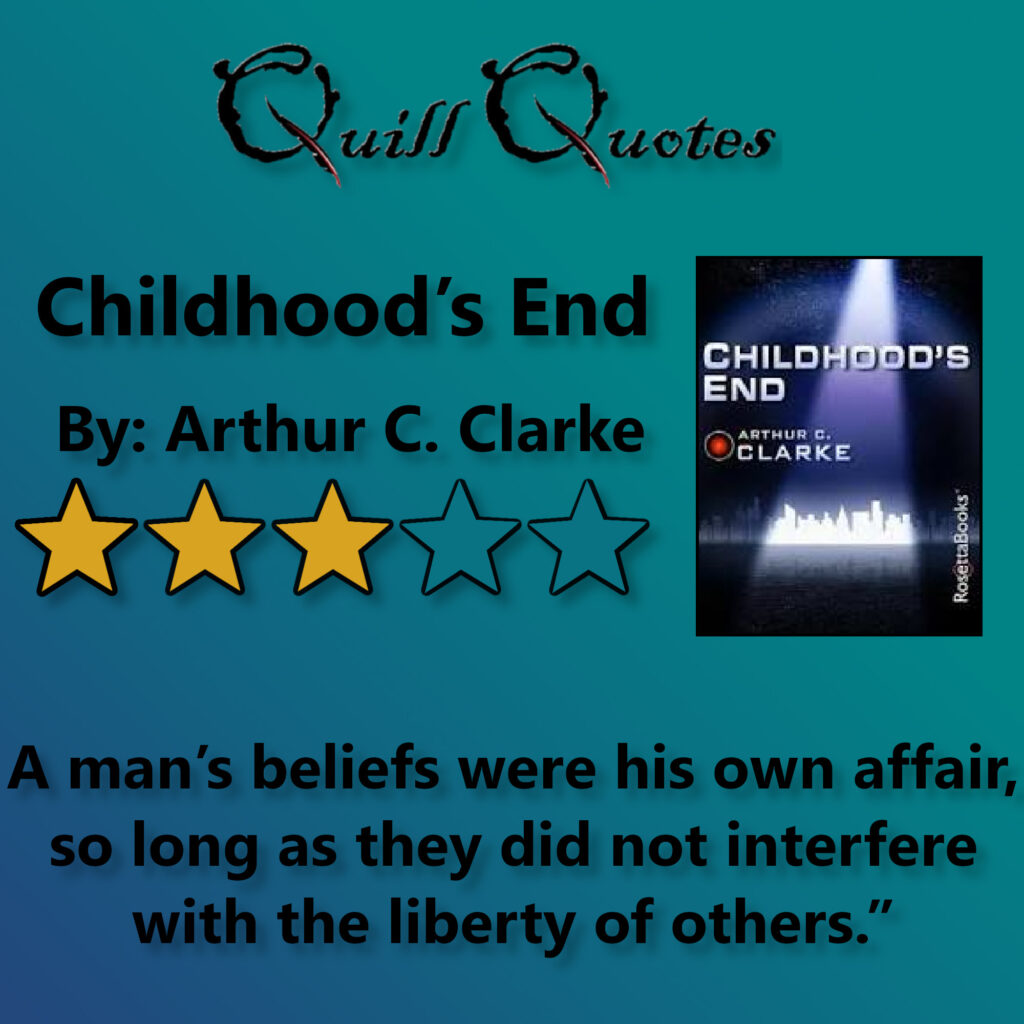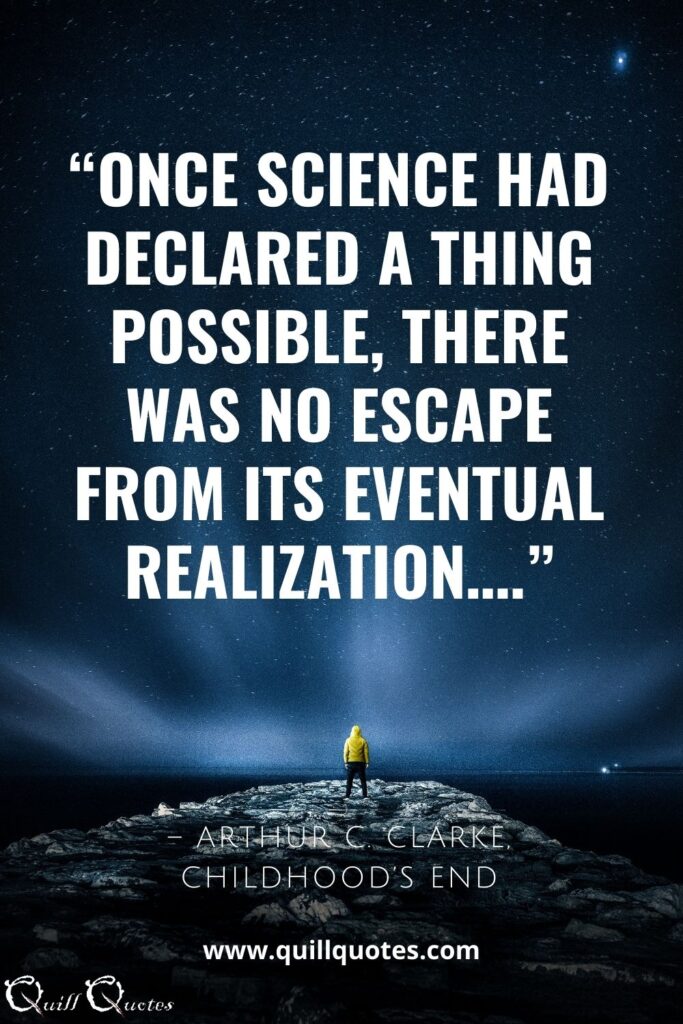I had to wait a few weeks to get Childhood’s End by Arthur C. Clarke from the library. It was a good read but I’m glad I didn’t buy it. I typically love Clarke’s work but only found this one so-so. I think it was his departure from hard science to include the paranormal that wasn’t for me. Meanwhile, many consider it his best novel so it’s worth a look!

Book Stats
- Title: Childhood’s End
- Author: Arthur C. Clarke
- Genre: Science Fiction
- Publication Date: 1953
- Pages: 211
- Est. Reading Time: 8 hours
- My Rating: 3/5 Stars
- Buy Now: Amazon or BAM!
Childhood’s End: Plot Summary
Published in 1953, a full four years before the first Earth satellite would be launched, Childhood’s End begins at the height of the predicted space race between the USA and Russia. However, before either of them can complete their first launch, a far superior alien race arrives on Earth with enormous spaceships descending above Earth’s major cities. Fortunately, the Overlords, as they’re called, are there to help humanity. They soon end war, poverty, racism, and cruelty, ushering in a golden age.
“He felt no regrets as the work of a lifetime was swept away. He had labored to take man to the stars, and, in the moment of success, the stars—the aloof, indifferent stars—had come to him.”
– Arthur C. Clarke, Childhood’s End
The apparent utopia comes at the cost of human progress and culture, though. With the technology provided by the Overlords, humanity’s creativity and ambition to leave Earth ceases. While most people are content to live in comfort, some begin to wonder if the Overlords’ goals for humanity are entirely benevolent…
Childhood’s End: My Thoughts
Based on the book’s opening disclaimer and foreword, written by Clarke in 2000, I almost decided not to read the book but, having waited for it, I went ahead. In the foreword, Clarke discusses the interest he had in the paranormal during the book’s writing but reveals he’s since become an almost total skeptic. He goes on to say that the book should still be enjoyed as a work of fiction, however; and that “a very impressive version of the opening” can be seen in the hit-movie Independence Day!
“When Childhood’s End first appeared, many readers were baffled by the opening disclaimer: “The opinions expressed in this book are not those of the author.” This was not entirely facetious; a year earlier, I had published The Exploration of Space and painted an optimistic picture of our future expansion into the universe. Now, I had written a book that said, “The stars are not for Man” and did not want anyone to think I had suddenly recanted.”
– Arthur C. Clarke, Childhood’s End, Foreword
Predictions
Despite my trepidations from the foreword, there’s still plenty of sci-fi to keep the book interesting (and believable). Who knows, maybe there really is an alien race out there that uses the paranormal. I’ve always found it amazing how the great sci-fi writers often seem to predict the future. For instance, Clarke’s prediction of the space race feels so accurate that I have to remind myself he wrote this prior to its occurrence! The only thing he got wrong is that he thought it would happen much slower, not foreseeing a satellite launch until after 1975.
“We’ll show them that Democracy can get to the moon first.”
– Arthur C. Clarke, Childhood’s End
In talking about ending racism and prejudice, another quote feels quite relevant to many of today’s struggles but leaves me wondering how much time will be needed?
“There were some things that only time could cure. Evil men could be destroyed, but nothing could be done with good men who were deluded.”
– Arthur C. Clarke, Childhood’s End
“Fifty years is ample time in which to change a world and its people almost beyond recognition. All that is required for the task are a sound knowledge of social engineering, a clear sight of the intended goal—and power.”
– Arthur C. Clarke, Childhood’s End
I also found Clarke’s prediction of average viewing time quite humorous, although it’s likely an underestimate for most of us today:
“Did you know that the average viewing time per person is now three hours a day? Soon people won’t be living their own lives any more. It will be a full-time job keeping up with the various family serials on TV!”
– Arthur C. Clarke, Childhood’s End
Science
Perhaps the accuracy of many sci-fi predictions stems from one of my favorite quotes:
“Once science had declared a thing possible, there was no escape from its eventual realization….”
– Arthur C. Clarke, Childhood’s End
Utopia
I do hope human society can move towards a sort of utopia described in Childhood’s End, just without the Overlords. The leisure time, lack of worries, and no need to work sound quite nice!
“Production had become largely automatic: the robot factories poured forth consumer goods in such unending streams that all the ordinary necessities of life were virtually free. Men worked for the sake of the luxuries they desired: or they did not work at all.”
– Arthur C. Clarke, Childhood’s End
Concepts like Universal Basic Income seem promising in moving us in the right direction. Although, I’m not sure automation has progressed to the point of making it feasible yet. Contrary to Childhood’s End, I think culture and art would actually increase given a utopian system with much more free time. But technological advancement might slow down. Unfortunately, I’m not sure a true utopia can ever be achieved or maintained for long:
“No Utopia can ever give satisfaction to everyone, all the time. As their material conditions improve, men raise their sights and become discontented with power and possessions that once would have seemed beyond their wildest dreams. And even when the external world has granted all it can, there still remain the searchings of the mind and the longings of the heart.”
– Arthur C. Clarke, Childhood’s End
“Utopia was here at last: its novelty had not yet been assailed by the supreme enemy of all Utopias—boredom.”
– Arthur C. Clarke, Childhood’s End
Education
Clarke presents education as the solution to much of the boredom problem and I couldn’t agree more! Given more free time, I’d likely spend much of it reading and learning about history.
“The existence of so much leisure would have created tremendous problems a century before. Education had overcome most of these, for a well-stocked mind is safe from boredom.”
– Arthur C. Clarke, Childhood’s End
Childhood’s End: Favorite Quotes
“Curiosity is one of the most dominant of human characteristics. You can’t defy it forever.”
“Science can destroy religion by ignoring it as well as by disproving its tenets. No one ever demonstrated, so far as I am aware, the nonexistence of Zeus or Thor, but they have few followers now.”
“Few men could look back upon a life that had seen so many of its ambitions achieved. Perhaps that was the trouble: in the years of retirement, however many they might be, he would have no further goals to give any zest to life.”
“It settled down obediently before the waiting cameras and the packed thousands of spectators, so few of whom could see as much as the millions gathered round their TV sets.”
“A man’s beliefs were his own affair, so long as they did not interfere with the liberty of others.”

“When the Overlords had abolished war and hunger and disease, they had also abolished adventure.”
“Communication was practically impossible, and Jan realized bitterly that getting in touch with an alien race was not as easy as it was so often depicted in fiction.”
“Anything completely unexpected is frightening. Until a novel situation is analyzed, it is safest to assume the worst.”
Childhood’s End: Final Thoughts
While this isn’t my favorite Arthur C. Clarke novel, I found I had much more to say about it and more highlighted quotes than I’d thought in writing this review! Maybe I’m being unfair since on its own I might rate Childhood’s End 4 stars, but in comparison to Clarke’s other work, I’m sticking to my original 3-star rating.
Do you find you judge your favorite author or one with a lot of books differently than a standalone book or your first read of an author? I think I’m more harsh in these situations since I’m comparing specifically to the author’s other works rather than rating in the hierarchy of all literature. I could also see it going either way, though, with author’s getting the “benefit of the doubt” based on their other books.
Have you read Childhood’s End by Arthur C. Clarke? I’d love to hear your thoughts, especially whether you appreciated the paranormal aspects or found them distracting?
You may also enjoy my reviews of Clarke’s The City and the Stars and Imperial Earth!


Sounds like an interesting book, sorry it didn’t live up to your expectations compared to the author’s previous works.
Great review, sounds like an interesting read
Wonderful review. It is not my usual cup of tea, but it would be interesting to read about their predictions about the space exploration.